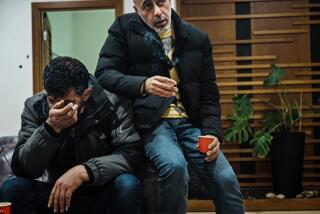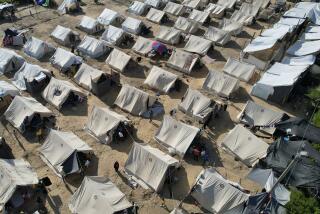In Cairo, Even the Dead Have to Share Living Space
- Share via
From our bus window, Cairo seemed in chaos. Its streets teemed with people. Its city buses were clogged to their open doors. Crowds waited at stops. Trash piled up in heaps. Traffic was anarchic. Horns beeped unceasingly.
The impression was of a city out of control, on the verge of catastrophe. We passed a vast cemetery--the City of the Dead--in whose tombs thousands of homeless had taken shelter. Donkey carts clattered down alleys. A layer of dust covered everything, giving the whole city the color of dung.
Every other house or apartment building seemed unfinished, but lived in--and lived on. Makeshift shelters stood on the top floors, possibly because the city receives less than one inch of rain a year.
Yet the city was fascinating. It had touches of its storied architectural splendor: an obelisk, a medieval mosque, fine homes, modern hotels along the Nile, emporiums of sin emblazoned with neon lights. But in the poor areas we saw block after block of mud brick hovels, each with its bright wash hung out to dry.
Cairo’s main problem, along with many others, is overpopulation. It already has 16 million people, and a baby is born every 20 seconds. It also attracts many migrants from the hinterlands and other countries. It grows by a million every year.
The day we drove about the city was the day after Ramadan, a feast day. Droves of children filled the streets and playgrounds. Most of them, especially the girls, wore bright clean clothes. They were beautiful. But one wondered what would become of them as their world became increasingly crowded.
We pulled in before the famous Museum of Egyptian Antiquities and parked among the usual mass of tour buses. Like everything else, the artifacts in the museum, even those behind glass, were covered with fine dust. The walls were peeling. The museum looked impoverished.
Yet it contains a wealth of ancient treasures--those not carried off to enrich the museums of Europe. That’s why we didn’t see the famous Rosetta Stone, from which a French scholar deciphered Egyptian hieroglyphics; it has long resided in the British Museum at London.
Because of the Muslim feast day, the museum was closed at noon and we were hurried out. The population of Cairo is largely Muslim. There are more mosques in Cairo than bars in San Francisco. Islam is pervasive. At prayer hours the voices of the muezzins calling the faithful to prayer are boomed out over the city by modern amplifiers. There is no escape.
That evening we had dinner on the terrace beside the pool of the Mena House Hotel. The buffet was splendid, though I had already started limiting myself to bread, potatoes and rice to avoid Cleopatra’s revenge, which, I had read, brings down two-thirds of all who travel in Egypt.
The speaker was the erudite and charming Kent Weeks, a professor of Egyptology at the nearby American University. I was particularly struck by a metaphor he used to explain the difficulty scholars have in understanding ancient Egypt.
“It’s as if,” he said, “scholars in the year 5090 were trying to understand the contemporary United States and they had nothing to go on but Forest Lawn, a few churches, the writings of Henry Kissinger and the letters of Tammy Bakker.”
So mysterious was the land we were about to explore.
Afterward I asked Prof. Weeks about the local wines. “Drink beer,” he said. “I tell all my students to drink the local beer. It will keep you well.”
It turned out to be the best advice I could have had.
As a warning of the perils we were about to face, Egyptian bugs devoured my wife’s ankles that night at dinner on the lawn. The next day the skin in back of and above her ankles was bloody red. This flaming discoloration lasted several days, gradually becoming bronze. Other women at the dinner complained of a similar malady. We men were probably spared by our socks.
We had come prepared with a bag of drugs, including antibiotics, specifics for diarrhea, Pepto-Bismol pills and other reliefs and preventives for angry stomach. We hadn’t thought of insect repellent.
At dinner we received some dismal news. Our plane for Abu Simbel would leave at 6 o’clock the next morning. Our bags would have to be out by 3:30. Breakfast would be at 4.
That meant we would have to get up at 3 o’clock.
It was going to be a long day.
More to Read
Sign up for Essential California
The most important California stories and recommendations in your inbox every morning.
You may occasionally receive promotional content from the Los Angeles Times.













